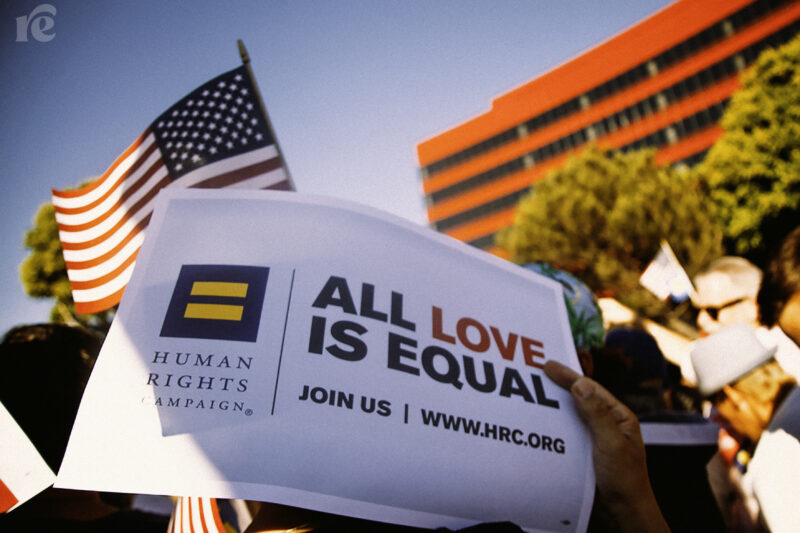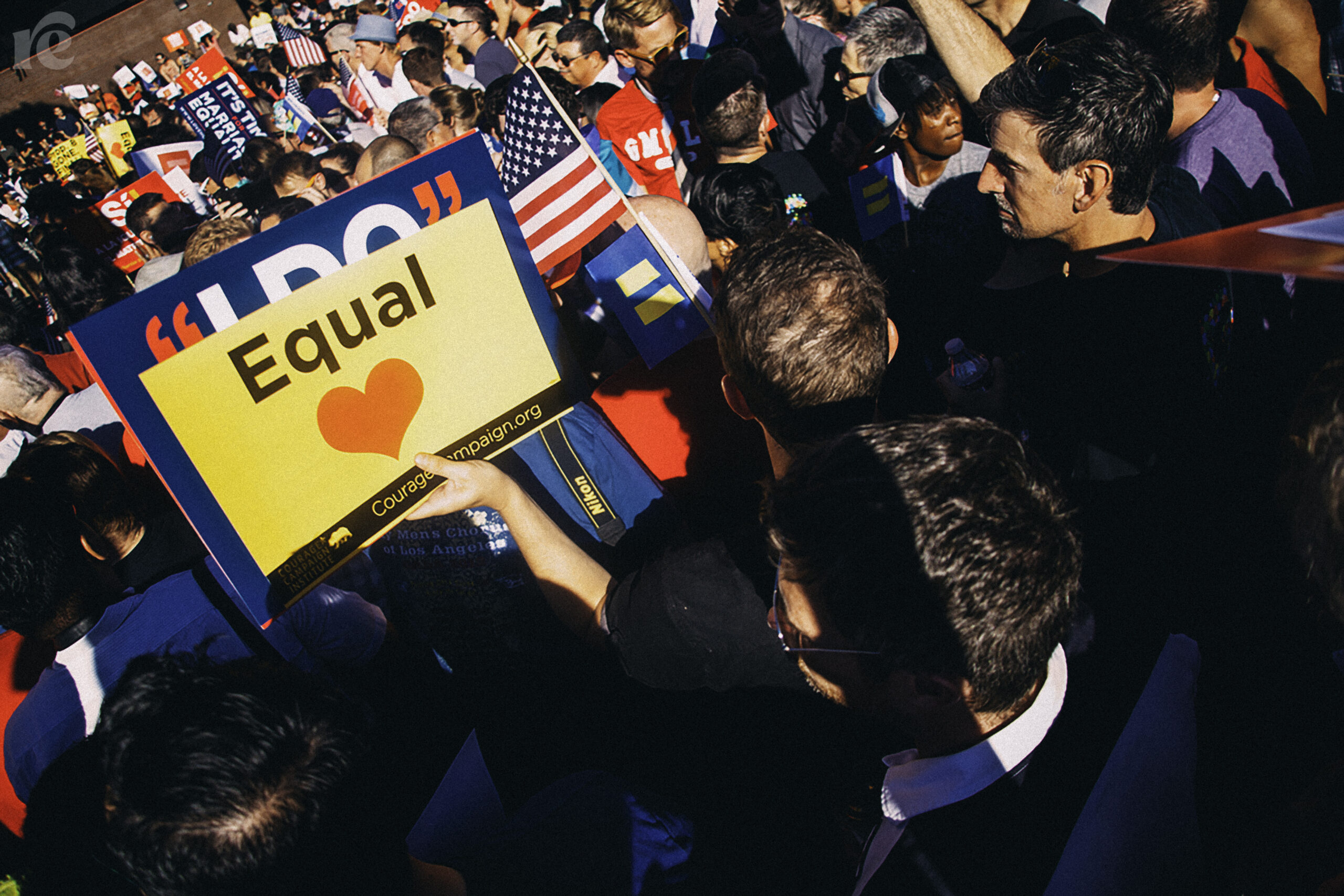We Are Not ‘Groomers’: How Anti-LGBTQ Stereotypes Inhibit Reproductive Justice
Even when legislative attacks against LGBTQ people fail to become law, the “groomer” stereotype has dangerous implications.

By labeling LGBTQ people as “groomers,” right-wing politicians and activists insinuate that we are sexual predators who pose a threat to children simply for existing as ourselves. This stereotype is used to promote a range of anti-queer and anti-trans laws that include criminalizing drag shows, banning LGBTQ topics from schools, and limiting access to gender-affirming care.
This strategy isn’t “new,” per se. In the 1970s, conservative activist Anita Bryant launched the “Save Our Children” campaign to bar gay and lesbian teachers from the classroom. (Bryant getting hit in the face with a pie is a delicious slice of queer history.)
But the pervasiveness of social media has exacerbated the impact of these stereotypes. In the weeks following the passage of Florida’s “Don’t Say Gay” bill, dubbed the “Anti-Grooming Bill,” the number of tweets featuring the term “groomer” rose by a startling 400 percent.
Even when legislative attacks against LGBTQ people fail to become law, the “groomer” stereotype has dangerous implications. For example, Boston Children’s Hospital received multiple bomb threats after an anti-LGBTQ TikTok account falsely accused them of “child mutilation” for offering gender-affirming care to trans youth.
In my work as a researcher on inequality and reproduction, I’ve collected interview data from trans women who are parents (or want to be parents in the future) to examine the “groomer” stereotype as a barrier to reproductive justice. This is part of a larger project to understand how race, class, and gender shape trans women’s parenting journeys.
Imagining the possibility of parenthood
Between 25 percent and 50 percent of trans adults have children, and the majority of trans people want children in the future. Still, many of the folks I talked with in my research have struggled to imagine themselves as parents, having internalized the idea that parenthood and trans-ness are incompatible.
“There’s the idea that queer people, especially gay men and trans women, are pedophiles, and it’s frighteningly effective,” said Laila, 28. “It makes it difficult for me to feel comfortable or safe being around any kids, let alone my own.” (Names have been changed for privacy reasons.)
Pearl, 26, shares a similar story. When I asked whether she always wanted kids, Pearl said, “Not at first.”
“I kept wondering how people are going to judge me,” she said. “Unfortunately, I got discouraged from how others talked about trans people, so that made me reject the idea.”
Increased surveillance of LGBTQ parents
Bathrooms are a focal point of anti-trans legislation. Portraying trans women as sexual predators, “bathroom bills” not only attempt to bar trans people from public spaces, but also incite harassment against anyone perceived to be trans.

For Nicole, 30, the possibility of anti-trans harassment has become yet another logistical detail that she must navigate as a single mother. Prior to transitioning, she’d change her son’s diaper in public restrooms, but now she’ll only change him in the car.
“Bathrooms are terrifying,” Nicole said. “Especially on long trips … I get nervous about what name he’s going to call me in public [mommy or daddy] and how other people will react to that.”
When I asked Amanda, 40, how anti-trans stereotypes affect her experience as a parent, she recalled taking her son to a Lego event at the mall, and then outside to the playground.
“I had this fear that someone was going to call security on me, just for existing,” she said.
It is vital, however, to understand the surveillance of LGBTQ parents in relation to the surveillance of communities of color. About half of Black children in the United States experience an investigation from Child Protective Services by the time they’re 18.
Anti-abortion billboards, meanwhile, claim that the “most dangerous place for an African American is in the womb.” Slogans like this only make sense if the viewer already believes that Black women are inherently dangerous to children and are bad mothers until proven otherwise.
Anti-trans and racist harassment have historically reinforced one another. For example, laws banning trans women from participating on women’s sports teams permit “suspicion-based tests” of someone’s testosterone levels. These tests are disproportionately performed on cisgender women of color who might not conform to the norms and aesthetics of white femininity.
Reproductive justice includes chosen family
To participate in my study, trans women didn’t need biological or legal connections to their children.
Skyi, 29, met one of her kids at a drag show.
“She approached me and was like, ‘You’re gorgeous. Could you be my drag mom?’” Skyi said.
Maria, 33, became a mother to kids she met while doing youth outreach in her community. She didn’t know that she was their mother until some of them tagged her on Instagram to celebrate Mother’s Day.
Other authors have argued that “anti-grooming” laws that purport to “protect youth” often do the opposite. I agree. Criminalizing LGBTQ events or preventing LGBTQ adults from working with youth will effectively isolate young people from caring adults in their community.
In other words, if so-called “anti-grooming” laws are enacted, women like Skyi and Maria might never have met their kids. This is the hypocrisy of “family values” that only recognize and support an extremely limited definition of family.
If you’re wondering whether reproductive justice includes chosen family, we need only look to the origin of the term. Black feminists coined the concept of reproductive justice in the fight against population control. And for Black feminists, “family” has always implied extended kinship networks rather than private, nuclear families set apart from their communities.
The “groomer” stereotype creates barriers to building all kinds of families. Fortunately, reproductive justice provides an excellent set of tools for fighting anti-LGBTQ hate, including a network of cross-movement coalitions, a commitment to body autonomy, and an understanding of how racial, economic, and gender inequalities work together to shape our everyday lives.
